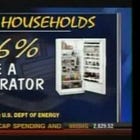Republican Rep Can't Believe Anyone Thinks Cutting $30 Billion From SNAP Would Hurt The Poor!
The House Farm bill is woof.
Last week, House Agriculture Committee Chairman Glenn “GT” Thompson (R-PA) released a draft of a very partisan Farm Bill. It totals $1.5 trillion and, as you have surely surmised “R-PA” and “very partisan,” it is a hot mess. And only five months late!
The House’s version of the Farm Bill, as it stands now, includes priorities like bringing whole milk back into schools (probably just some weird “own the libs” thing); barring California from barring the sale of meat from out-of-state farms that treat their livestock inhumanely; decreases workplace protections for farmworkers; bars states from limiting or regulating pesticides; eliminates climate-related safeguards from the Inflation Reduction Act; exempts farms from the 1071 Rule of the Equal Credit Opportunity Act, which the HEAL Food Alliance explains “would allow farm credit system lenders to stop reporting loan data to the Consumer Financial Protections Bureau” and allow them to discriminate against non-white farmers without anyone finding out.
Oh! And it would cut the Supplemental Nutrition Assistance (SNAP) program by $30 billion over 10 years, at a time when groceries are becoming ridiculously expensive.
That sounds bad, and it sounds even worse in light of a recent study conducted by the Urban Institute, which found that in 2023 SNAP benefits did not cover a moderately priced meal in 98 percent of counties. Especially considering that the price of “a moderately priced meal,” is calculated at $3.37. The average amount of money-per-meal that recipients get is, instead, $2.84.
The study also determined that “In the first three quarters of the year, SNAP benefits fell $58.59 short of monthly food costs. By the end of 2023, SNAP benefits fell short of monthly food costs by $49.29.”
Cost-of-living increases, it found, also did not really do much of anything for recipients in 2023.
Naturally, Democrats had some things to say about this $30 billion cut. Senate Agriculture chairwoman Debbie Stabenow (D-Michigan) was a very, very hard no.
“Tell you what: If we get to the end of the year [and] instead of a farm bill, I have protected nutrition for children and families in this country, I’m okay with that,” Stabenow said on Tuesday.
For his part, Rep. Thompson was absolutely shocked to discover that anyone thought that cutting $30 billion from SNAP would negatively impact those who rely on it for survival.
He believes that because the cuts will come from preventing the United States Department of Agriculture (USDA) from updating the cost of the Thrifty Food Plan beyond adjustments for inflation (which — please to recall — that study just determined were not very helpful).
"They're being disingenuous, they're being misleading, and maybe some of them — there are some I think that started this — that are perhaps lying for political purposes, which is really shocking when it comes to the Agriculture Committee," Thompson said to Newsweek.
To be fair, math does have a well-known liberal bias.
A Republican staffer who worked on the bill reportedly called those who oppose cutting SNAP “hunger weirdos.” Because it is very weird to care whether or not people starve to death.
The Thrifty Food Plan is the USDA’s way of determining how much money to give SNAP recipients to ensure they have a healthful diet. Inflation is a factor, of course, but so are new scientific developments in health and diet. The plan was updated in 2021 for the first time since 2006, resulting in SNAP recipients receiving an average of $12-$16 more a month. However! The 2018 Farm Bill included a directive that the Thrifty Food Plan be reevaluated and updated every five years, which Thompson’s cuts are clearly seeking to undermine.
Let’s hear what Sen. Stabenow said to Newsweek about this nonsense, shall we?:
If the budget results in SNAP receiving $30 billion less, she says, it amounts to a cut that the "seniors and families" who participate in the program will feel.
"The average person that's getting some help from us as Americans is getting $6.00 a day, and [House Republicans] are trying to say that if they eliminate a small increase, that amounts to about $1.50 a week, that's not a big deal," Stabenow told Newsweek. "If you only have six dollars of food, that's a big deal."
It certainly is!
This is, by the way, the first trillion dollar Farm Bill. So it’s not as though we’ll be spending less money on the whole, because Glenn Thompson is such a fabulously fiscal conservative. We’re not. We’re spending far, far more. The reason for the cuts to SNAP and to the Commodity Credit Corporation (CCC) is to finance absolutely enormous increases in the amount that farmers get paid for crop subsidies and crop insurance. The bill, as proposed by Thompson, increases the reference prices of peanuts, rice, and cotton, directing billions of dollars to farmers of these crops.
Just to be clear, these hikes mean that Thompson and other Republicans would like to take food out of the mouths of starving children in order to give it to farmers — farmers who make several times more than the average American, with those at the top getting the most — regardless of how well they are doing at the time.
However, Agriculture Secretary Tom Vilsack says that there is no possible way that these cuts could even begin to pay for the enormous subsidies that Thompson wants to get for these farmers, telling The Hill that the House simply “doesn’t have the resources, if they follow the rules, to be able to do everything that they’re doing.”
Markups on the bill will start today in the House, and the good news is that, with just a slim Republican majority in the House and a Democratic Senate, it is highly unlikely that the no-good-very-bad parts of this bill will survive for very long.
PREVIOUSLY:







"Hunger weirdos."
The cruelty is the point. But I just want to take a little moment to highlight this Republican staffer, the best part of them having dried up on their parents' taints.
These are people (Thompson included) who will never EVER know what it feels like to be hungry. They'll never know the desperation of rooting through trash, being considered trash by the vast majority of the people in this country.
They don't care that SNAP actually HELPS their neighbors, including the ones who have farms because the money spent to acquire the food means their produce is getting sold and making them money. Getting more food to the needy in this, the wealthiest society that has ever existed, HELPS them.
But they do this because they believe cutting SNAP will harm their ultimate target, their fictive *Black* single mother driving to the welfare office in a supposedly nice car, and buying lobster tails. They believe this hurts Black people more especially and that's why they vote time and time again to fuck themselves.
Speaking as a person whose family got food stamps when I was a kid:
Fuck you, Glenn Thompson. Fuck you very much FFS.